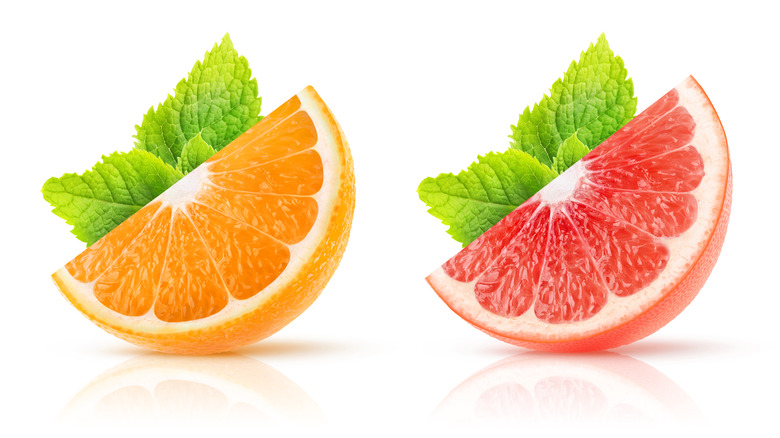Is There A Nutritional Difference Between Grapefruits And Oranges?
Grapefruits and oranges are popular citrus fruits, but is there a nutritional difference between them? According to Healthline, half of a medium-sized grapefruit has 52 calories, 13 grams of carbohydrates, 1 gram of protein, and 2 grams of fiber. Oranges have similar values, with a medium-sized orange having 60 calories, 15.4 grams of carbohydrates, 1 gram of protein, and 3 grams of fiber, as reported by WebMD. Both fruits are loaded with minerals and antioxidants and contain vitamins A, B, and C, which all help support healthy immune systems.
Healthline reports that Vitamin C is an antioxidant that may reduce certain cancer and heart disease risks. It's also great for the skin by promoting collagen production and helping with discoloration, hyperpigmentation, and aging. High in potassium, grapefruits and oranges may help maintain healthy blood pressure and blood sugar levels and further reduce heart disease risks. Both fruits contain citric acid, which may help disintegrate kidney stones and remove them from the body.
Furthermore, both fruits are great sources of hydration, with half of a medium-sized grapefruit containing around 4 ounces of water and about 86% of an orange being water. Both grapefruits and oranges contain folate and thiamine, which are B vitamins. Folate is especially important for pregnant women so the fetus and placenta can properly form and develop, per Healthline. So far it seems like the nutrition and health benefits of grapefruits and oranges are extremely similar. Let's see what else the two citrus fruits have in common.
Both are low in calories and packed with similar antioxidants
Per Healthline, grapefruits contain zinc, iron, and copper, which help strengthen the skin's natural barrier, while oranges contain high levels of calcium, which is vital for bone, muscle, and organ health and strength. Grapefruits also have malic and tartaric acids, which may improve skin texture, while oranges contain ascorbic acid.
Grapefruits have magnesium and various antioxidants, such as beta-carotene and flavanones. Beta-carotene may minimize risks of cancer, heart disease, and certain eye diseases, while flavanones may provide inflammation relief from high cholesterol and blood pressure, per Healthline. A few other antioxidants can be found in oranges, such as hesperidin, which has anti-inflammatory properties; naringenin, which supports healthy blood vessels; and beta-cryptoxanthin, which prevents damage to cells (per Healthline). Both fruits contain lycopene, which supposedly helps with side effects from cancer treatments and decelerates tumor growth.
Some medications, such as immunosuppressants, carbamazepine, indinavir, benzodiazepines, statins, and calcium channel blockers, may not work when consuming grapefruits. Oranges may create high potassium levels when eaten while taking beta blockers, which could result in damage to the kidneys, as per WebMD. Moreover, the citric acid content in grapefruits may lead to the erosion of tooth enamel, especially in anyone with sensitive teeth, and the acid content in oranges may intensify gastroesophageal reflux disease symptoms. Lastly, too much vitamin C could result in high iron, aluminum (if paired with phosphate binders), and estrogen levels (if taken while on hormone replacement therapy).

